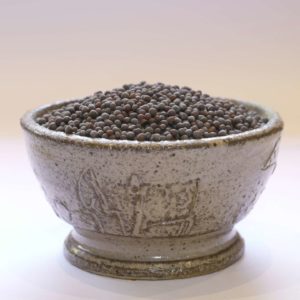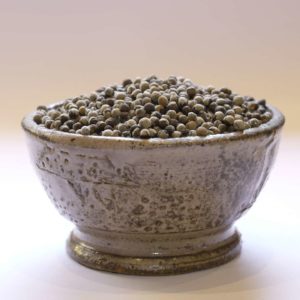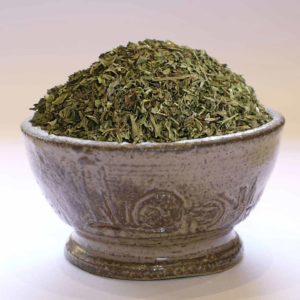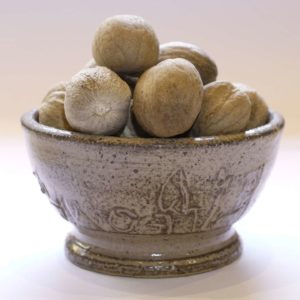0
- ONLINE GROCERY
- OUR HISTORY
- BLOG
- CONTACT
- MY ACCOUNT
- PRO
2,10 €21,00 € /kg
The aroma of Chia Seeds is discreet, pleasant and rather neutral.
Incorporated into your preparations, whether savory or sweet, chia seeds will bring you all their benefits and increase the nutritional value of your dishes. This little seed can be eaten plain, toasted, ground or added to liquids (mucilage takes on a "gelatinous" consistency).
In accordance with European regulations [article 1 - EU Commission implementing decision - January 22, 2013 - C(2013) 123], the recommended daily intake is limited to 15 grams.
In accordance with European regulations [article 1 - Commission
of the EU Commission - January 22, 2013 - C(2013)
123], the recommended daily intake is limited to 15 grams.
History
For centuries, 3,500 BC, the Aztecs (and Amerindian populations more generally) grew and fed on this small seed. They also used it for medicinal and religious purposes. The staple of their vegetable diet (along with beans and corn), chia represented for the Aztec people the "symbol of life", until the 15th century, when the arrival of the Conquistadors brought an abrupt end to Aztec civilization and culture.
Ignored for centuries, the chia seed (pronounced "Tchia") gradually made a comeback in the 1990s and has been firmly established on the international scene since 2010. A member of the sage and mint family, this little tiger seed is one of the new food plants, although it has always been used in Central America. In fact, ʺchiaʺ comes from the nahualtl ʺchiapanʺ (meaning ʺeaux river of chiaʺ) and gave its name to the Mexican state of Chiapas. From Bolivia, Black Chia Seed (Salvia hispanica) will convince you with its many virtues.
Properties
Introduce seeds into your daily diet: up to two tablespoons a day (approx. 10-15g). This quantity is equivalent to about one to two tablespoons of oil (lipid content).
It is recommended for...
- anyone (children, teenagers, students, athletes, pregnant or breastfeeding women, mobile and sedentary workers...): it is an excellent source of fatty acids (omega-3 of plant origin). Chia seeds are also said to help reduce cardiovascular disease thanks to their abundance of antioxidants (flavonoids), and to play a role in lowering bad cholesterol levels(1).
- elderly people suffering from intestinal sluggishness: its soluble fiber content gently stimulates transit, and its calcium content contributes to daily calcium intake (osteoporosis prevention).
- for diabetics: it also provides energy and maintains it over time, as it helps stabilize blood sugar levels. As such, it helps prevent type 2 diabetes(2).
- Allergy sufferers: chia seeds can be used as a thickener in place of eggs.
- vegetarians, vegans and vegetarians: chia seeds are a very interesting energy source, as they can be incorporated into culinary preparations, increasing the calorie content (e.g.: mixed salads) and contributing to the daily protein intake. It also provides an interesting nutritional and energy complement: nutrients (calcium, phosphorus, manganese, zinc, iron, etc.), vitamins (mainly from groups B and E) and proteins.
B and E groups) and proteins.
However, the nutritional characteristics and health benefits presented here need to be qualified, given that
the daily quantity that can actually be consumed...
Consumption
Bathed in water, it can be used in place of eggs (one heaped teaspoon of chia seeds and 3 equivalents of water).
Chia seeds can be sprinkled on soups, sauces or pesto, sweet or savoury salads, pastries, cereals, yoghurts or smoothies, breads, pies, lasagne, cereals, legumes, rice and vegetables, vegetable cakes... It's up to you to try them out!
Recipe idea for 4: Pour 200ml almond milk, 20g cocoa powder, 60g chia seeds and 25g Rapadura sugar into a small bowl. Mix well and leave to rest in the fridge for an hour. Once out of the fridge, add cocoa powder, shredded coconut, dried pomegranate or powdered speculoos to the top of the mixture if desired, and you've got a delicious pudding that's a hit with young and old alike!
Recommendations
Black Chia Seeds should be part of a varied, balanced diet.
However, this product is not recommended in the event of :
- food allergies to other seeds (sesame, poppy, flax, etc.),
- kidney failure
- intestinal disorders,
- poor circulation; not recommended for people taking anti-coagulants.
For those sensitive to dehydration, chia seeds should be eaten soaked in mucilage; otherwise, ingested as they are, they will mobilize digestive fluids.
Finally, excessive consumption of chia seeds can lead to intestinal problems that are not serious (e.g. bloating).
(1) Ayerza, R & Coates, W. "Dietary levels of chia: influence on yolk cholesterol...". (2000) and "Effect of dietary alpha-linolenic fatty acid derived from chia..." (2007)
(2) "Supplementation of conventional therapy with the novel grainS alba (Salvia hispanica L.)...". - Vladimir Vuksan, 2002 and Diabetes Care, 2007
| Weight | 50 g |
|---|---|
| Weight | 50g box, 50g pouch, 100g pouch, 200g pouch, 500g pouch |
| Botanical nomenclature | Salvia Hispanica |
| Continent-Country | Europe |



